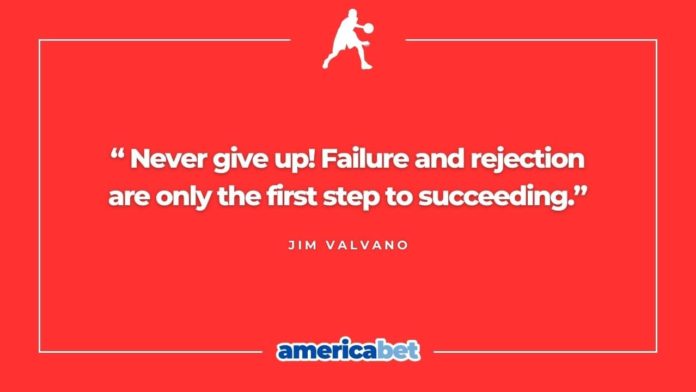Introduction: Embracing Resilience in the Game of Life and Betting
Jim Valvano, affectionately known as “Jimmy V,” was not just a legendary basketball coach but a symbol of indefatigable spirit. His famous 1993 ESPY speech, encapsulating his life’s philosophy of never giving up despite facing terminal cancer, continues to inspire millions. Valvano’s rallying cry, “Never give up! Failure and rejection are only the first step to succeeding,” is not just a testament to his own life but serves as a universal beacon of perseverance.
In both life and sports betting, the journey is fraught with setbacks and challenges. The essence of Valvano’s message lies in viewing each setback not as a defeat but as a stepping stone towards greater achievements. This article explores the profound impact of resilience on success and how this principle can guide sports betting enthusiasts to approach gambling with responsibility and strategic insight. By embodying the spirit of perseverance, we can transform failures into foundations for future success, ensuring that each bet, each decision, is a step forward, not backward.
The Psychology of Perseverance
Resilience, a vital psychological attribute, is the ability to bounce back from setbacks, adapt to adversity, and keep moving forward in the face of failures. This never-give-up attitude is essential for success in any domain, as it allows individuals to persist where others might concede defeat. Psychological resilience isn’t just about enduring; it’s about using experiences as catalysts for growth and improvement.
In the realm of sports psychology, resilience is often the distinguishing factor between average and elite performers. Athletes face frequent and, at times, very public failures—missed opportunities, losses, and poor performances. How they react to these setbacks dictates their future success. Sports psychologists advocate for a mindset that views failure as informational—a source of feedback and a clear indicator of areas needing improvement. This approach encourages athletes to adjust their strategies, refine their skills, and approach their next challenge with improved tactics and renewed vigor.
Translating this to sports betting, the same principles apply. Bettors encounter losses regularly, but the resilient ones analyze these events to understand what went wrong. Was it a flaw in their betting strategy? Did they fail to consider crucial information? By approaching losses as learning opportunities, bettors can adapt their strategies, enhancing their analytical skills and improving their decision-making processes over time.
This mindset shift—from viewing failure as a setback to seeing it as a stepping stone—is crucial for long-term success. It builds not only a stronger psychological resilience but also a more robust betting strategy that can withstand the ups and downs of sports betting. Embracing this approach ensures that each setback refines rather than defines one’s betting journey.
Stories of Comebacks
From Sports Arenas to the Boardroom: Triumphs of Perseverance
Sports: Michael Jordan’s Bounce Back Michael Jordan, perhaps the greatest basketball player of all time, was famously cut from his high school basketball team—a setback that could have derailed many young athletes. Instead, Jordan used this rejection as motivation to work harder, eventually leading the Chicago Bulls to six NBA championships and earning five MVP awards. His journey is a prime example of how setbacks can serve as a profound motivation to achieve greater success.
Business: Steve Jobs’ Return to Apple Parallel to Jordan’s comeback in sports is Steve Jobs in the business realm. Ousted from Apple, the company he co-founded, Jobs didn’t let this professional setback end his career. Instead, he founded NeXT and Pixar, both of which made significant impacts in their fields, before returning to Apple. His return marked one of the most extraordinary comebacks in business history, revitalizing Apple and leading it to become one of the most valuable companies in the world.
Sports: Serena Williams’ Grand Slam Comeback Serena Williams faced a series of health issues and injuries that would have ended most athletes’ careers. Yet, she returned to dominate women’s tennis, winning numerous Grand Slam titles post-recovery. Her resilience not only defines her career but also inspires countless others in any field that recovery and determination can lead to spectacular success.
Business: Howard Schultz and Starbucks Howard Schultz’s return to Starbucks as CEO after stepping down is another testament to perseverance. When Starbucks struggled during the financial crisis, Schultz returned to reinvent and re-energize the company, focusing on customer experience and expanding its global presence. His leadership turnaround mirrored a sports comeback, emphasizing strategic changes and resilience.
These stories across diverse fields illustrate that setbacks can be turned into setups for future successes. Whether in sports betting or business, the principles of resilience and perseverance remain the same—every failure is a lesson, and every setback is a potential springboard for future success. By learning from each misstep and continuing to push forward, success is not just a possibility, but an inevitability.
Lessons from Sports Betting
Applying Perseverance to Master the Odds
The world of sports betting, much like competitive sports, is replete with unpredictability and challenges that test the bettor’s resilience. Embracing the principles of perseverance in this field can significantly impact one’s success rate, transforming losses into valuable lessons.
Strategic Approach and Planning Success in sports betting begins with a well-thought-out strategic approach. This involves researching teams, understanding the dynamics of the sport, analyzing historical data, and applying statistical methods to forecast outcomes. Just as athletes train rigorously to perfect their skills, bettors need to hone their analytical abilities and strategic thinking to succeed consistently.
Learning from Losses In sports betting, losses are inevitable, but their impact depends on the bettor’s response. A resilient bettor views each loss as a critical learning opportunity. This involves reviewing betting decisions to identify missteps—whether it was an overestimation of a team’s performance, a failure to account for external factors like weather conditions, or a lapse in judgment regarding odds. Each review should lead to refined strategies, helping bettors improve their decision-making process over time.
Adapting Strategies Adaptability is a core component of perseverance. In sports betting, the conditions change constantly—new players rise, old players decline, teams change strategies, and odds fluctuate. Successful bettors adapt their strategies based on new information and changing circumstances. This might mean adjusting bet sizes, diversifying bet types, or shifting focus to different sports or leagues.
Implementing Responsible Gambling Practices Crucially, integrating responsible gambling practices is an essential aspect of a strategic approach in sports betting. Setting limits on bets, knowing when to walk away, and never chasing losses are all practices that safeguard a bettor’s financial and emotional well-being. Responsible gambling not only supports long-term participation in betting but also aligns with the principle of learning from past experiences without causing harm.
Responsible Betting: A Must for Long-term Success
Sustaining Perseverance through Responsible Gambling Practices
Responsible gambling is not merely a recommendation; it is essential for the longevity and success of any bettor. It ensures that the pursuit of betting remains a healthy and balanced part of one’s life, rather than a detrimental obsession.
Why Responsible Gambling Matters In sports betting, the thrill of the win can sometimes overshadow the reality of the risk. Responsible gambling practices prevent the common pitfalls of betting such as chasing losses or betting beyond one’s means. They help maintain a clear-headed approach where decisions are based not on emotion but on calculated strategies. This discipline is crucial in maintaining perseverance, as it prevents the despair that often follows reckless gambling, keeping the bettor in control and ready for the next opportunity.
Setting Limits One of the most effective responsible gambling practices is setting betting limits. This includes setting aside a specific amount of money that one can afford to lose without impacting other financial responsibilities. It is also wise to set time limits to avoid the pitfalls of binge betting, which can lead to quick and thoughtless wagering. These limits should be revisited and adjusted based on one’s betting performance and personal financial situation.
Understanding Odds and Making Informed Decisions Odds in sports betting are a reflection of the probability of a particular outcome, and understanding these odds is key to making informed betting decisions. Bettors should educate themselves on how odds are calculated and what they represent, which helps in assessing the value of a bet more accurately. This knowledge also aids in developing a more strategic approach to betting, focusing on value over volume.
Learning from Failures without Jeopardizing Financial Stability Using failures as learning opportunities is a cornerstone of responsible betting. Each loss should be analyzed to understand what went wrong and how similar mistakes can be avoided in the future. This might involve reviewing one’s betting history to identify patterns that lead to losses or reassessing one’s approach to betting under certain conditions. Importantly, this review process should be done without the urge to immediately recoup losses, as such impulses can lead to riskier bets and greater losses.
Conclusion: Embracing Resilience for Sustainable Success
Jim Valvano’s inspiring legacy teaches us the indispensable value of never giving up, regardless of the domain—be it in sports, business, or sports betting. This article has underscored the significance of resilience, a quality that enables individuals to transform failures into stepping stones toward success.
In the context of sports betting, adopting a never-give-up attitude means more than persisting after losses; it involves learning from each experience, adjusting strategies, and most importantly, practicing responsible gambling. By setting limits, understanding odds, and analyzing failures, bettors can maintain financial and emotional stability, which is crucial for long-term engagement and success.
The path to mastery in any field is riddled with setbacks. Viewing each failure as an integral and natural part of the journey towards success is essential. This perspective not only fosters a resilient mindset but also enhances the ability to make informed and strategic decisions in betting and beyond.
We encourage our readers to internalize this mindset, approach sports betting with discipline and responsibility, and apply the principles of perseverance in every aspect of life. By doing so, you embody the true spirit of Jim Valvano’s words: “Never give up! Failure and rejection are only the first step to succeeding.” Let these principles guide you as you navigate the highs and lows, ensuring that every setback refines your approach and every victory is celebrated as a milestone in the journey of resilience and success.

